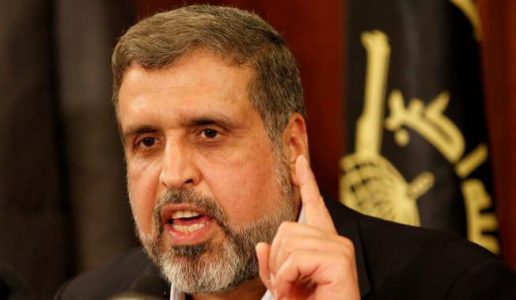
Former Palestinian Islamic Jihad leader and wanted terrorist Ramadan Shalah dies after years in coma
Ramadan Shalah, who headed the Palestinian Islamic Jihad militant organization for over two decades, died Saturday at the age of 62. He had been in a coma for two years following a stroke.
The group didn’t say where he died, but he was believed to have been in Lebanon.
Despite significant differences, Palestinian Authority President Mahmoud Abbas issued a statement of mourning, joining all other Palestinian factions.
Shalah was laid to rest in Damascus, despite earlier statements by senior Islamic Jihad official Nafez Azzam that Egypt has agreed to transfer Shalah’s body for burial in Gaza via Cairo and the Rafah crossing.
Right-wing Israeli politician Naftali Bennett attacked Prime Minister Benjamin Netanyahu and Defense Minister Benny Gantz for “approving” the transfer of Shala’s body, arguing that it should have been part of an exchange involving the return of the bodies of two Israeli soldiers held by Hamas in Gaza.
Shalah was buried following the afternoon prayers in the Palestinian refugee camp of Yarmouk in Damascus. His funeral was attended by Syria-based Palestinian officials.
Shalah was born in 1958 in Gaza. In 1981, he was a member of the original group that founded the Palestinian Islamic Jihad organization under the leadership of Dr. Fathi Shkaki, a physician from Rafah, on the Egyptian border.
The organization prioritized the Islamic concept of jihad, contrasting with the national-secular struggle of Fatah and other militant organizations on the Palestinian left. Alongside Hamas, Islamic Jihad became one of the deadliest terrorist organizations operating in the region.
Like Shkaki, Shalah was an academic, with a Ph.D. in banking and economics from Durham University in England. He lectured on international relations in Tampa, Florida, where he also temporarily headed the World & Islam Studies Enterprise.
Striving to be an “Islamic think tank,” WISE aimed to foster academic links between Muslim and Western researchers. It was closed in 1995 by U.S. authorities for links to Islamic Jihad.
In 1995, following Shkaki’s assassination by the Mossad in Malta, Shalah became the organization’s secretary general, based at the Palestinian Islamic Jihad headquarters in Damascus.
Shalah was added to the FBI’s list of most wanted terrorists in 2006. He is accused of overseeing the killing of hundreds of Israelis in suicide bombings and rocket attacks. This notably includes the suicide bombing outside Dizengoff Center in Tel Aviv on the 1996 Purim holiday, in which 13 people were murdered, and the attack on the jointly Jewish-Arab owned Maxim restaurant in Haifa in 2003, in which 21 people died.
Throughout his tenure, Islamic Jihad adopted a pragmatic approach to intra-Palestinian issues, supporting the reconciliation attempts between Fatah, which controls the Palestinian Authority, and Hamas, which rules Gaza.
The organization was torn apart by major internal rifts howver, mainly due to influence from outside partners, including Syria, which gave the organization shelter, Iran, which provided it with funds, and Hezbollah. However, a resident of the Gaza Strip who knew him told Haaretz that “everyone knows Islamic Jihad is considered a protege of Iran, but Shalah opened a channel with everyone, including the Gulf states.”
In April 2018, Shalah underwent complicated heart surgery at Al Rassoul al-Azam Hospital, which Hezbollah operates in Beirut. The movement denied he had been poisoned, as some commentators in Palestinian media intimated, attributing his illness to natural causes. He never came out of the ensuing coma.
He was succeeded as the head of Islamic Jihad in September 2018 by Ziad al-Nakhaleh.
Source: Haaretz





